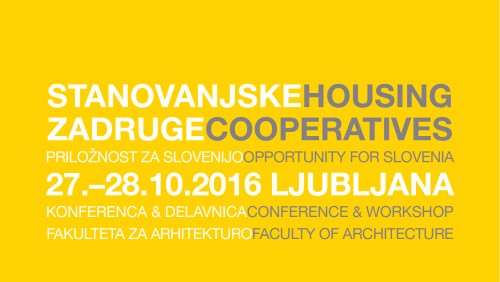News / 14.10.2016
Housing Cooperatives – Opportunities for Slovenia
Ljubljana, Faculty of Architecture, 27. October
Program
GERMAN EXPERIENCE
ROBERT BURGHARDT, ENRICO SCHÖNBERG Mietshäusersyndikat, Berlin
MICHAEL LAFOND id22: Institute for Creative Sustainability, Berlin
"A Housing Metamorphosis: Inclusive CoHousing Projects and Current Neighborhood Developments from Berlin and Other European Cities"
FLORIAN KÖHL fatkoehl architekten, Berlin
"Architecture of Choice"
TADEJ SLAPNIK State Secretary, responsible for establishing dialogue with the civil society, coordinating civil initiatives and social entrepreneurshiptor
ANJA PLANIŠČEK Faculty of Architecture
SWISS EXPERIENCE
ANDREAS HOFER Archipel, Zürich
"Collaborative Ways of Thinking Housing and a Sustainable Future"
DAVID LEUTHOLD pool Architekten, Zürich
"Innovation Cooperative"
AUSTRIAN EXPERIENCE
KATHARINA BAYER einszueins architektur, Wien
Wohnprojekt Wien - Cohousing in Vienna: Potentials of Building and Living Together
Housing politics is very passive in Slovenia, mainly due to a large, 92% share of privately owned apartments, small share of non-profit rental ones and almost non-existing rental market. Housing affordability is low, especially for young, elderly and people with low and even middle range income.
Some years ago two NGOs (iPoP - Institute for Politics of Space and Institute Tovarna) started a bottom-up 'battle' for cooperative housing, which is understood as a good alternative to existing situation. This year Faculty of Architecture, University of Ljubljana, newly established cooperative Zadrugator and NGO Trajekt - Institute for Spatial Culture joined the 'battle' and managed to get political support.
In late October we are organizing a one-day conference with a goal to achieve changes of housing politics: legislation, finance and finally develop a suitable cooperative housing model for Slovenia. We intend to focus on three themes: architecture, housing cooperative/co-housing models, networks. Models from other countries and experience of different groups will serve as starting points for development of our own model and further actions.
Program
GERMAN EXPERIENCE
ROBERT BURGHARDT, ENRICO SCHÖNBERG Mietshäusersyndikat, Berlin
MICHAEL LAFOND id22: Institute for Creative Sustainability, Berlin
"A Housing Metamorphosis: Inclusive CoHousing Projects and Current Neighborhood Developments from Berlin and Other European Cities"
FLORIAN KÖHL fatkoehl architekten, Berlin
"Architecture of Choice"
TADEJ SLAPNIK State Secretary, responsible for establishing dialogue with the civil society, coordinating civil initiatives and social entrepreneurshiptor
ANJA PLANIŠČEK Faculty of Architecture
SWISS EXPERIENCE
ANDREAS HOFER Archipel, Zürich
"Collaborative Ways of Thinking Housing and a Sustainable Future"
DAVID LEUTHOLD pool Architekten, Zürich
"Innovation Cooperative"
AUSTRIAN EXPERIENCE
KATHARINA BAYER einszueins architektur, Wien
Wohnprojekt Wien - Cohousing in Vienna: Potentials of Building and Living Together
Housing politics is very passive in Slovenia, mainly due to a large, 92% share of privately owned apartments, small share of non-profit rental ones and almost non-existing rental market. Housing affordability is low, especially for young, elderly and people with low and even middle range income.
Some years ago two NGOs (iPoP - Institute for Politics of Space and Institute Tovarna) started a bottom-up 'battle' for cooperative housing, which is understood as a good alternative to existing situation. This year Faculty of Architecture, University of Ljubljana, newly established cooperative Zadrugator and NGO Trajekt - Institute for Spatial Culture joined the 'battle' and managed to get political support.
In late October we are organizing a one-day conference with a goal to achieve changes of housing politics: legislation, finance and finally develop a suitable cooperative housing model for Slovenia. We intend to focus on three themes: architecture, housing cooperative/co-housing models, networks. Models from other countries and experience of different groups will serve as starting points for development of our own model and further actions.
